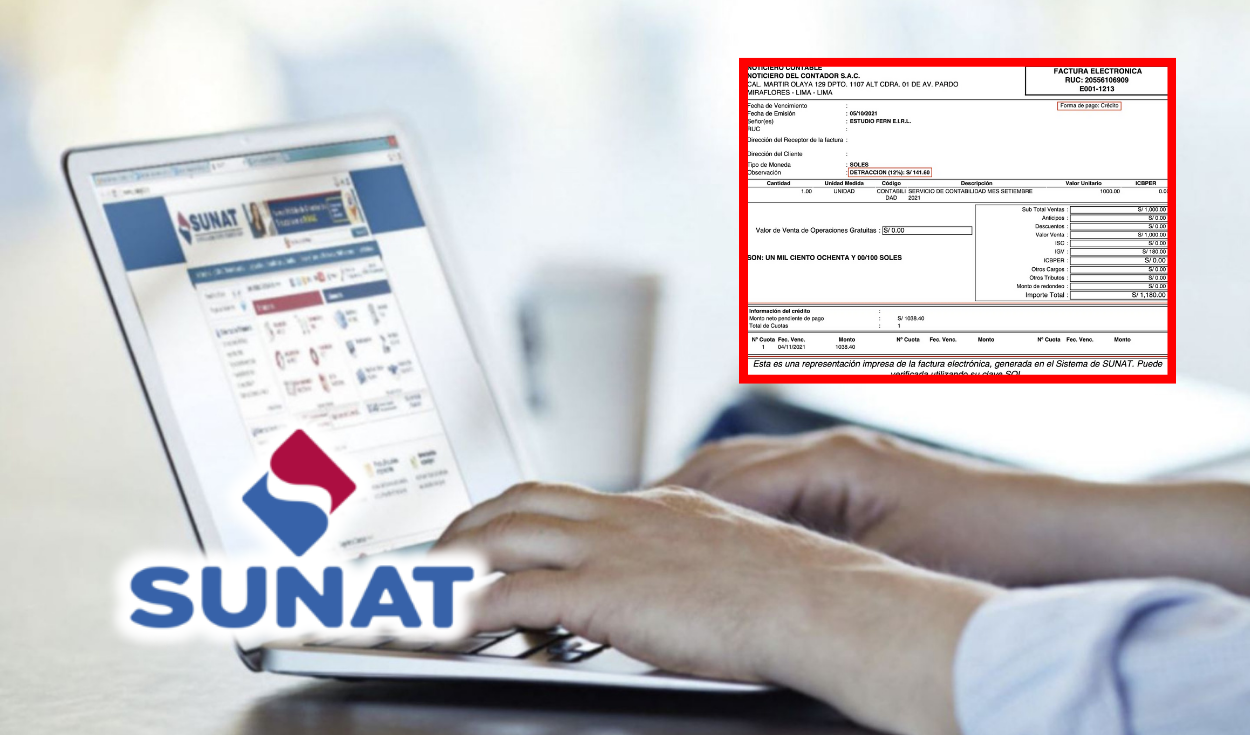
Business and companies in Peru must comply with the obligation to Issue electronic invoices to register their income and support fiscal credit in their statements before the National Superintendence of Customs and Tax Administration (Sunat). This requirement is indispensable for those who belong to different tax regimes.
The use of the electronic invoice not only optimizes accounting management, but also allows greater fiscal control and facilitates the tax declaration. In 2025, the Electronic emission system (SEE) of the SUNAT continues to be the mandatory platform for the issuance of these documents.
How to emit an electronic invoice in SUNAT?
To issue an electronic invoice through the electronic emission system – Sol, follow these steps:
- Access the official Sunat website (at the following link) and log in with your RUC, user and Sun key.
- In the main menu, select “companies” → “payment vouchers” → “see – Sol” → “electronic invoice”.
- Enter the sale data, including the buyer’s RUC or DNI, corporate name, product or service, amount and quantity.
- Choose the payment method:
- COUNT: If the payment is made at the time of the issuance.
- Credit: If the payment will be made later, indicating the expiration date and the amounts.
- Check and confirm the information, then click “Issue”.
- Download the voucher in digital format and send it to the customer by email or printed.
It is worth noting that the SUNAT stores all the emitted electronic invoices, so you can consult them at any time in the option “Consult Invoice” within the Portal.
Sunat 2025: Who should issue electronic invoices?
Since 2023, SUNAT promoted the Electronic billing as mandatory for most taxpayers in Peru. In 2025, they must issue these vouchers:
- Companies and businesses registered in the RUC, with fiscal domicile “have”.
- Taxpayers received to the following tax regimes:
- General regime
- MYPE Tax regime
- Special Rent Regime
- Agrarian regime and agricultural cooperatives
- Legal and natural persons who carry out commercial operations with customers who have RUC.
It should be noted that electronic invoices should also be issued for export operations, regardless of whether the buyer is domiciled in Peru or abroad.
Conditions and considerations for the issuance of electronic invoices
At the time of emit an electronic invoiceit is essential to meet the following conditions established by the SUNAT:
- The acquirer must have active RUC, except in export operations.
- The issuer’s RUC must have a “have” status and not be in “temporary suspension of activities” or “registration low.”
- You must have an Internet connection to access the SUNAT platform.
- The invoice cannot be used to transfer goods, since for this a remission guide is required.
Those who issue the invoice, if the payment is carried out at the time of the issuance, the “counted” option must be selected. On the other hand, if the payment will be subsequent, the “Credit” option must be chosen and indicate the pending amount and the expiration date. In credit payments, the Net Pending Amount does not include retentions of IGV or other concepts subject to deductions.
How to declare taxes if I have a business?
If you have a company in Peru, you must declare and pay taxes according to your tax regime. Natural or legal persons registered in the Unique Taxpayers Registry (RUC) are obliged to submit their monthly income statement (Third Category Income).
The payment of taxes is made following the expiration schedule established by the SUNAT, according to the last digit of your RUC. These are the tax regimes under which you must declare taxes:
- Special Income Regime (RER)
- MYPE TAX REGIME (RMT)
- General Regime (RG)
- New Simplified Single Regime (NRUS)
Taxpayers of the general regime and the MYPE Tax regime must submit an annual tax declaration, calculated from January 1 to December 31. In addition, SUNAT establishes sanctions for those who fail to comply with their tax obligations. It is advisable to review every year the maturity schedule published by the SUNAT to avoid penalties.
What is the electronic invoice in Peru for?
The electronic invoice It is a mandatory fiscal document in Peru that supports costs, expenses and fiscal credit in tax declarations. Its implementation responds to the need to digitize billing and optimize the control of commercial operations. Those who issue their electronic invoices may enjoy the following benefits:
- Greater tax control: facilitate inspection and reduce tax evasion.
- Legal support of operations: It serves as proof of sales made and payments received.
- Cost and time savings: eliminates the use of paper and streamlines document management.
- Digital access at all times: allows you to consult and download invoices from the Sunat platform.
- Validity in export operations: it is a requirement for foreign trade.
Since the mandatory implementation of electronic billing, Peru has improved fiscal transparency and reduce administrative costs for companies.
Source: Larepublica
Alia is a professional author and journalist, working at 247 news agency. She writes on various topics from economy news to general interest pieces, providing readers with relevant and informative content. With years of experience, she brings a unique perspective and in-depth analysis to her work.












